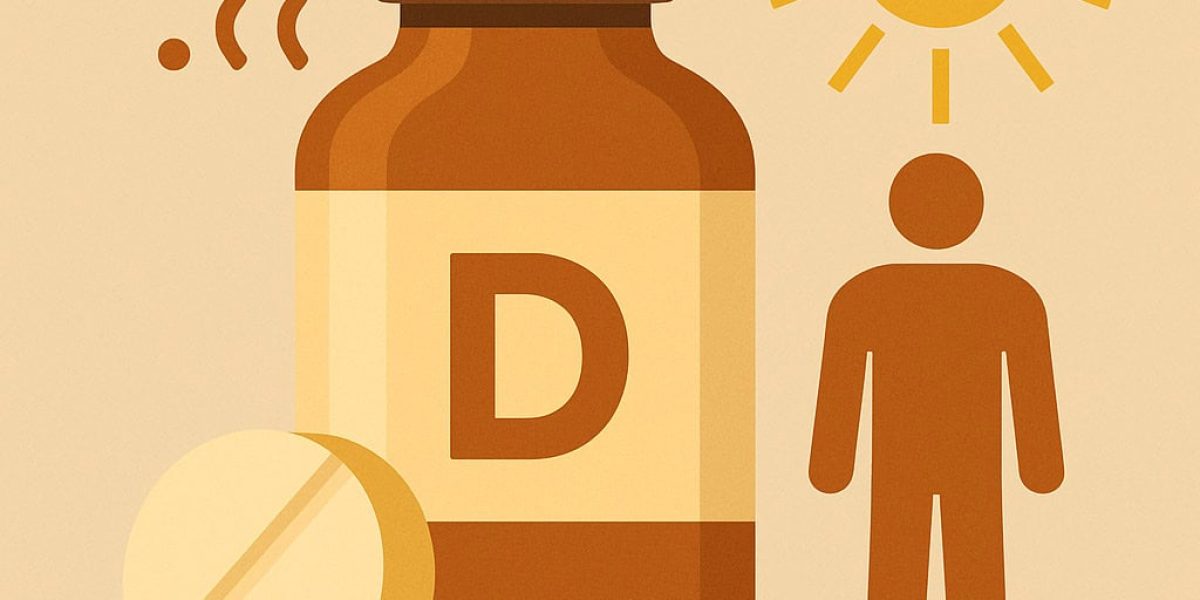Vitamin D is known as the “sunshine vitamin” and plays a crucial role in your health. We all know how important it is to get enough, but did you know that it is also possible to take too much? While an overdose is fortunately very rare, it is good to know what to watch out for to avoid taking in too much.
What exactly is vitamin D?
Vitamin D is not actually a real vitamin, but a hormone that plays a crucial role in several body functions. Your body needs it primarily for the absorption of calcium and phosphate from food, which is essential for strong bones and teeth. It also supports the immune system and contributes to normal muscle function.
What’s special about it is that your body can largely produce it itself. When your skin is exposed to ultraviolet B radiation (UVB) from the sun, it converts a substance in your skin to vitamin D3. This is then converted in your liver and kidneys to the active form that your body can use.
Different types
There are two main forms of vitamin D in supplements: vitamin D2 (ergocalciferol) and vitamin D3 (cholecalciferol). Vitamin D3 is identical to the form your body makes itself and traditionally comes from animal sources, but is also available today from plant lichen. Vitamin D2 is extracted from other plant sources.
For supplements, we recommend choosing the third form because your body can process this form more effectively and retain it longer. However, both forms can cause the same problems when overdosed.
What happens when there is an excess of vitamin D?
It is a fat-soluble substance, which means the body stores excess amounts rather than excreting them. This is different from water-soluble vitamins such as vitamin C, which your body excretes through urine. Because of this property, this substance can accumulate in your body during prolonged high intake.
The problem arises because it helps absorb calcium from food. When you take in too much, it can lead to elevated calcium levels in your blood, a condition called hypercalcemia. These elevated calcium levels are the cause of most of the problems that arise from overdose.
Recognizable symptoms of too much vitamin D
The symptoms of excess are often the result of too much calcium in the blood. We recommend that you be alert to the following signs:
- Stomach and bowel problems: Nausea, vomiting, abdominal pain, constipation or just diarrhea can be a result of too high a dose of vitamin D. These symptoms occur because the increased calcium level interferes with your digestion.
- Fatigue and weakness: You may feel unusually tired, even though you have had adequate sleep. Many people also experience muscle weakness and a feeling as if their body feels heavier than normal.
- Thirst and frequent urination: Excessive thirst and frequent urge to urinate are common symptoms with elevated calcium levels.
- Neurological symptoms: In more severe cases, symptoms such as confusion, dizziness and disorientation may occur.
When does a vitamin D overdose occur?
It is almost impossible to get too much from sunlight. In fact, your skin regulates production and stops it after a certain amount of UVB radiation. An overdose through food is also very unlikely: you would have to eat huge amounts of oily fish to have problems.
An overdose actually occurs only with long-term use of excessive doses as a dietary supplement. The number of people in the Netherlands who take more than the safe maximum intake is very small (less than 0.1 percent).
Safe dosage and legal limits
The European Food Safety Authority (EFSA) has determined that adults should ingest a maximum of 100 micrograms per day. Dutch law states that a dietary supplement may contain a maximum of 25 micrograms: a dosage that is safe and effective for most people. For people with an increased risk of deficiency, this dosage may even be necessary.
We recommend that you always follow the dosage on the package and never take more than is recommended. Also be sure to buy supplements from reliable suppliers, as unfortunately there are supplements in circulation that contain more vitamin D than stated on the label.
The importance of vitamin K2
An interesting point we would like to share with you is the importance of vitamin K2 in vitamin D supplementation. Whereas vitamin D is necessary for the absorption of calcium from food, vitamin K2 sends the mineral to the right place in the body, such as your teeth and bones. This can help prevent calcium from accumulating in unwanted places such as kidneys and blood vessels.
Longer-term risks
More serious health problems can occur with long-term overdose. Too high a concentration of calcium in the blood can lead to the formation of kidney stones and may eventually cause kidney function problems. Cardiovascular problems can also result from calcium deposits in blood vessels.
Our advice for safe use
At Dutch Balance, we believe it is important that you use vitamin D safely. We recommend:
- Always follow the recommended dosage on the package
- If in doubt about the correct dosage, contact your physician or pharmacist
- Have a blood test done if you suspect your vitamin D levels are too high or too low
- For symptoms that may indicate excess seek medical attention immediately
Choose quality vitamins
Your health deserves number one quality products. At Dutch Balance, you will find only tested vitamins and minerals that meet all legal requirements. For example, we offer high-quality vitamin D3 capsules from plant lichen for optimal absorption.
An overdose is rare but can have serious consequences. By taking supplements consciously and not exceeding recommended dosages, you can safely enjoy the benefits of vitamin D. If you have any questions, our team is always available to help you make the right choices for your health.




